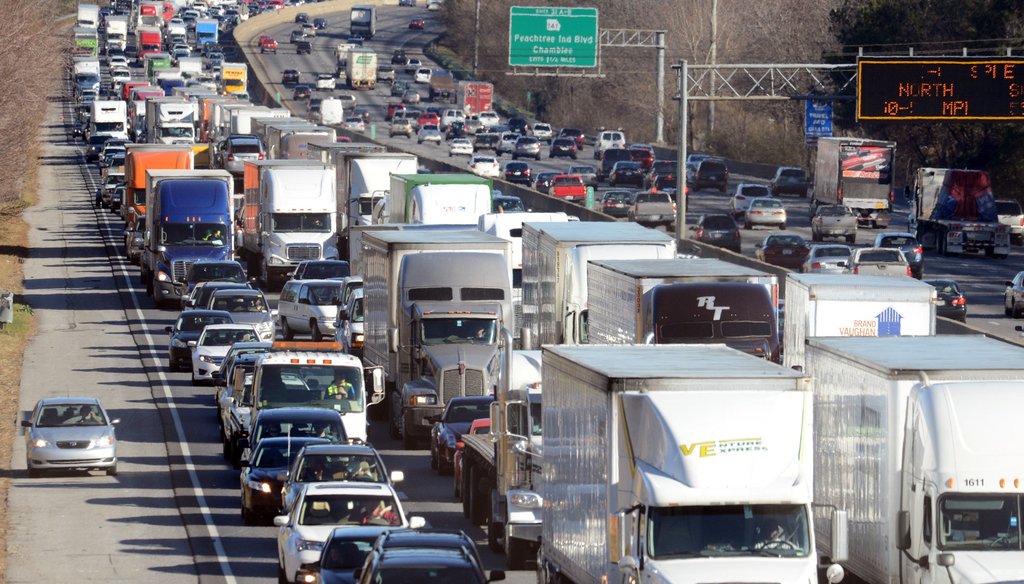Stand up for the facts!
Our only agenda is to publish the truth so you can be an informed participant in democracy.
We need your help.
I would like to contribute

Traffic snarls on I-285 westbound due to a midday accident. Photo by Kent D. Johnson / AJC
Gov. Nathan Deal on Monday signed into law a new transportation plan that will bring in about $1 billion a year Georgia to tackle a backlog of projects.
"Each day, Georgians set out in the pursuit of a brighter future, and it is our roads and bridges that bear the weight of our success," Deal said during the signing. "We’ve reached the point where we can no longer keep up with the growing infrastructure demand that encourages job creation, maintains our businesses’ bottom lines and takes us home to our families. This investment reflects our modern-day population and current infrastructure usage. Today, we are ensuring that Georgia’s economic engine will remain running for generations to come. I commend the courage of the General Assembly for tackling this issue head-on and prioritizing public safety and future growth over politics."
PolitiFact Georgia followed the proposal’s iterations through the recent Legislative session and fact checked several claims about just what the funding measure is and does.
A BILLION DOLLAR TAX HIKE?
Eventually, most Georgians will pay more at the pump under the law, which takes effect July 1.
But the actual tax hike associated with shifting from the combination of excise and sales taxes for gas to a single excise tax could take a while.
The current mixed system of a 7.5 cent per gallon excise tax and 4 percent state sales tax creates an effective rate of 17 cents per gallon of gas, based on the current AAA fuel price of $2.37 a gallon.
Moving to a higher excise tax, at today’s rates, means motorists will pay 26 cents a gallon in taxes.
But PolitiFact ruled Mostly True on a claim from Tea Party Atlanta chairman Debbie Dooley, that the law is still a "billion dollar tax increase."
That’s because that excise tax is indexed to inflation, meaning it can increase as soon as next year. And the law also includes several new fees and the elimination of some tax credits, which will leave nearly every Georgia driver paying more over time.
THE TOURIST TAX ELEMENT
It’s not just motorists who will end up paying more under the plan.
The law also includes a $5-a-night fee on hotel and motel stays in Georgia, for out-of-state and in-state tourists alike.
The hospitality industry opposed that last-minute provision in the bill, which would raise an estimated $158 million next year that would go toward road and bridge projects.
Michael T. Owens, president and CEO of the Tourism Leadership Council in Savannah, told GPB that the charge would have a "serious effect" in that tourist hot-spot and statewide.
"We absolutely expect to see cancellations of major, major groups," he said.
PolitiFact Georgia can't predict the future. But we did fact-check claims that the fee would add tens of thousands of dollars in costs for large groups.
Economists correctly note that hotels could absorb the new tax – and at least in the Savannah market save money by doing so rather than allowing a seven percent drop in stays.
But new costs generally get passed along to customers, at least in part. Owens' overall point is legitimate.
We rated his claim Mostly True.
A DEAD-END ON ELECTRIC AVENUE
An alert reader wrote in as the transportation tax was wending its way through the process, questioning if it would revokes a tax credit for consumers’ electric cars while the state retains similar credits for similar vehicles for businesses.
The final bill did eliminate the popular $5,000 state tax credit for all-electric vehicles ($2,500 for low-emission vehicles). Owners of such vehicles, meanwhile, would be required to pay a $200 annual registration fee.
House Transportation Chairman, state Rep. Jay Roberts, R-Ocilla, said electric vehicle owners "practically pay nothing" to lease and operate those cars.
The tax credit cost the state $13.6 million in 2013. Eliminating it is expected to generate $16.4 million next year, and nearly $90 million in 2017.
At the same time, the new bill remains silent on the income-tax credit available to businesses. They get up to $20,000 for purchasing purchase a heavy-duty alternative fuel vehicle and up to $12,000 for the purchase of medium-duty alternative fuel vehicles.
However, that credit expires in 2017 anyway.
Consumers looking for a similar break need to buy or lease by June 30. We rated the claim that the tax credit for those vehicles is being eliminated as of July 1 as True.
Our Sources
See individual reports.












































